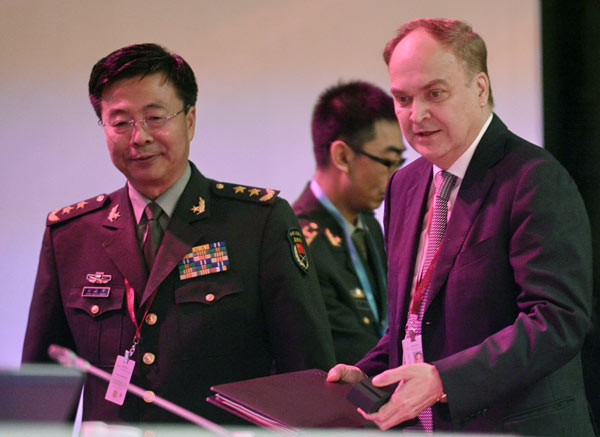Abe, Hagel's accusations rejected
By ZHAO SHENGNAN in Singapore and CHEN WEIHUA in Washington (China Daily) Updated: 2014-06-02 00:12China has never taken the first step to provoke trouble, PLA officer says
 |
|
Wang Guanzhong, deputy chief of the General Staff of the People's Liberation Army, and Russia's Deputy Minister of Defense Anatoly Antonov attend a plenary session of the Shangri-La Dialogue in Singapore on Sunday. [Photo/Agencies] |
Wang Guanzhong, the highest ranking military official in the Chinese delegation at an Asia-Pacific security forum, started his speech by highlighting the common aspiration for a utopia with the same name as the event: Shangri-La.
However, the deputy chief of the General Staff of the People's Liberation Army didn't continue with his mild comments as planned on the last day of the Shangri-La Dialogue in Singapore.
The lieutenant general diverted from the script about midway through the speech, saying he felt forced to respond to Tokyo and Washington's finger-pointing at China.
Japanese Prime Minister Shinzo Abe opened the forum on Friday night with a high-profile speech full of thinly veiled comments targeting China.
US Defense Secretary Chuck Hagel went further on Saturday, directly accusing China of "destabilizing" the South China Sea and by backing Tokyo's pursuit of a more muscular military role as a counterweight to Beijing.
"The speeches made by Mr Abe and Mr Hagel gave me the impression that they were coordinated with each other, they supported each other, they encouraged each other and they took the advantage of speaking first at the Shangri-La Dialogue and staged provocations and challenges against China," Wang told defense, military representatives and scholars from 27 countries.
Calling such rhetoric "unacceptable" and "unimaginable", Wang said: "China has never taken the first step to provoke trouble. China has only been forced to respond to the provocative actions by other parties."
When responding to the "nine-dash line" in the South China Sea, one of the many questions he received after the speech, Wang questioned the US motive for criticizing China, saying Washington should first abide by international laws by ratifying the United Nations Convention on the Law of the Sea (UNCLOS), a document Beijing has ratified.
"When will the US ratify the UNCLOS?" Wang asked.
Wu Shicun, president of the National Institute for South China Sea Studies, said Wang sent a message that a growing China is not a threat to the world. On the contrary, it firmly safeguards regional stability.
Li Cheng, director of the John L. Thornton China Center at the Brookings Institution, is worried that the bilateral relationship has been moving in the wrong direction lately.
With recent events such as US government's espionage charges against five PLA (People's Liberation Army) officersas well as recent rhetoric, the US-China relationship is moving toward a wrong and very dangerous direction,Li said.
Zhu Zhiqun, director of the China Institute and a professor of political science and international relations at Bucknell University in Pennsylvania, said the unusual confrontational rhetoric doesn't augur well for the bilateral relationship.
Zhu believes part of the reason is that US President Barack Obama has been attacked at home for being inexperienced in foreign policy and the latest prison exchange with the Taliban made him even more vulnerable.
"With mid-term elections coming soon, US policy toward China may become tougher, at least in rhetoric.On the other hand, the Xi Jinping administration is still consolidating power and cannot afford to appear weak internationally," Zhu said.
"So political tensions between China and the US may rise in the near future. One should not underestimate the difficulties in establishing the so-called "new type of big power relations" between the two sides. The bottom line is that problems associated with the global power transition are plaguing the two nations now,"
Issues involving China, the US and Japan took center stage at the three-day meeting in Singapore.
Zhou Qi, a senior researcher at the Chinese Academy of Social Sciences, said Washington is using the territorial rows between China and the Philippines and Vietnam to challenge China and seek regional support for its Asian rebalancing policy.
Geoffrey Till, emeritus professor of maritime studies at King's College London, said the US is pursing "a very delicate balance" as it supports its allies obliged by treaties, but it also avoids tosee conflicts in the region.
Despite the unusually strong language directed toward each other, Wang and Hagel dedicated part of their speeches to calling for improved military ties.
Bonnie Glaser, senior advisor for Asia at the Center for Strategic and International Studies, said no one should be surprised by the fact that the US and China have differences.
Glaser said problems should be discussed in the open sometimes, especially when the problems affect and involve other nations.
"That is the case with the South China Sea. The need to abide by international law, and avoid use of force and coercion was a message voiced by many nations, not just by the US and Japan," she said.
Lori Forman, a professor at the Asia-Pacific Center for Security Studies in the US, said open conversation is the key to managing differences and maintaining stability.
- More female officials caught in corruption
- Whampoa veterans recorded with glory
- Police bust 9 terrorist groups in Xinjiang
- Knife-wielding attackers seized in Xinjiang
- New regulation leads to drop in petitioned cases
- Hunan plant shut as probe into lead poisoning begins
- Police boost efforts to combat gambling
- Project offers jobs openings to legal experts
- Experts: Dog meat festival 'illegal'
- Nation looks to upgrade
pipeline networks






